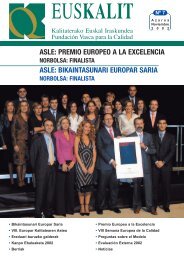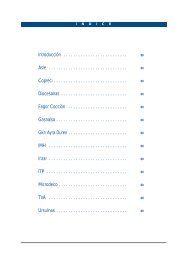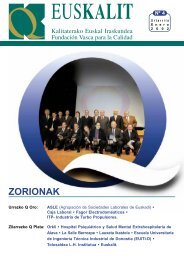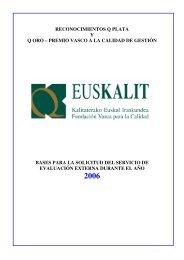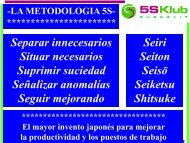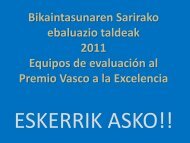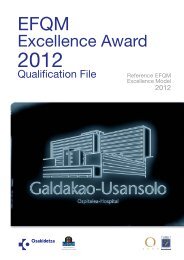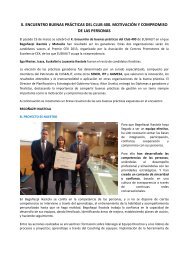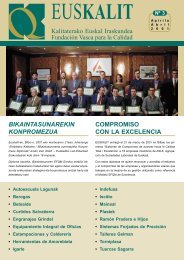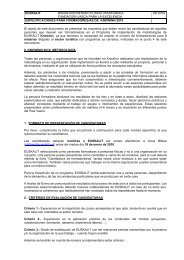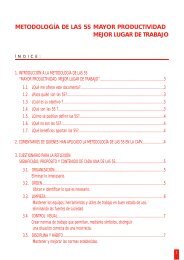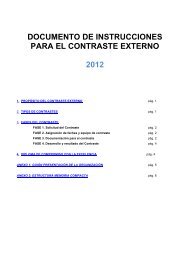Olabide Ikastola - Euskalit
Olabide Ikastola - Euskalit
Olabide Ikastola - Euskalit
You also want an ePaper? Increase the reach of your titles
YUMPU automatically turns print PDFs into web optimized ePapers that Google loves.
1 LEADERSHIP leadership EFQM Excellence Award 2010 3<br />
1. LEADERSHIP<br />
1a. Leaders develop the Mission, Vision, Values and ethics<br />
and act as role models.<br />
Approach and deployment<br />
<strong>Olabide</strong> <strong>Ikastola</strong>, hereinafter referred to in this submission document<br />
as <strong>Olabide</strong>, is a parent cooperative, so decisions are taken by<br />
the Steering Committee (SC) in line with directives established by<br />
the Governance Board (GB). In turn, these decisions are implemented<br />
by the Management Team (MT), the members of which<br />
are the main leaders of the school. The GB is the highest level of<br />
governance of the school and represents and defends the interests<br />
of the General Assembly of Cooperative Members, who by definition<br />
are both owners and, as parents of the pupils, customers of<br />
<strong>Olabide</strong>. Parents therefore take active part in the decision-making<br />
process, so the <strong>Olabide</strong> organisational structure is designed to be<br />
both functional and to maximise across-the-board participation.<br />
To do so, a management by processes model has been deployed<br />
with a view to maximising shared responsibility among all our<br />
people, and for all <strong>Olabide</strong> people to put forward improvement<br />
suggestions. This proactive approach is designed to ensure that<br />
all our people feel part of and identify with what <strong>Olabide</strong> stands<br />
for, and therefore with the Mission, Vision, Values (MVV) and<br />
ethics of the school.<br />
In <strong>Olabide</strong>, leadership is defined as follows:<br />
• We understand leadership as the collective set of attitudes<br />
and behaviour of our leaders which enables the delivery of<br />
our Mission and Vision.<br />
• We consider leaders to be all those <strong>Olabide</strong> people who,<br />
relative to their responsibility level, stimulate and inspire<br />
other members of the organisation to perform to the best of<br />
their abilities, focusing them on the delivery of the <strong>Olabide</strong><br />
Mission and Vision and acting as role models of the Values<br />
of the school.<br />
• Leadership is therefore practised at different levels, i.e. Management<br />
Team (MT), Quality Coordination Team (QCT,<br />
composed of the owners of Process Systems [PS, 5a]), Department<br />
Heads, process owners, project leaders and Compulsory<br />
Secondary Education (CSE) and Upper Secondary<br />
Education (USE) tutors.<br />
Fig. 1a.1: <strong>Olabide</strong> definition of leadership<br />
As a result of MT reflection in 2006-07, the decision was taken to<br />
include CSE and USE tutors as leaders, as they are responsible<br />
for leading and driving the activities of the teachers within their<br />
group and coordinating effective teamwork. This improvement<br />
action has led to greater all-round recognition and effectiveness<br />
of their work.<br />
Successive assessment and review activities regarding who should<br />
be leaders in <strong>Olabide</strong> have led to the deployment over time of<br />
a greater number of leaders in the school, which has now levelled<br />
off and stabilised. Satisfaction levels with leadership have<br />
increased as a result, as shown below.<br />
Indicator 00-01 02-03 03-04 04-05 05-06 06-07 07-08 08-09<br />
Satisfaction<br />
with leaders<br />
5.15 5.28 5.75 6.86 6.2 6.7 7.01<br />
No. of<br />
leaders<br />
5 9 31 47 46 73 65 59<br />
Fig. 1a.2: Indicators on leadership in <strong>Olabide</strong><br />
The changes which have taken place in <strong>Olabide</strong> would not have<br />
been possible without leadership aligned to the MVV of the<br />
school, a leadership geared towards securing the support and<br />
joint efforts of all <strong>Olabide</strong> people working towards a common<br />
goal. In 2006-07, as a result of assessment and review, the list of<br />
general leadership attitudes and behaviour was refined and improved<br />
for greater coherence with the <strong>Olabide</strong> MVV. This list is<br />
shown below:<br />
• Lead by example. It is easier to get others involved if leaders<br />
are the first to practise what they preach, e.g. giving classes,<br />
curricular programming, managing processes, etc.<br />
• Empathy. Treat others as you would like them to treat you.<br />
Observe, understand and anticipate the emotions of others,<br />
taking into account each person’s individuality, e.g. when communicating<br />
decisions, assigning responsibilities, in day-to-day<br />
contact, when monitoring his/her performance, when giving<br />
recognition, etc.<br />
• Mutual trust. Leaders belief in themselves, their trust in the<br />
people of the organisation and the people’s trust in them. For<br />
this to be so, leaders must be seen as colleagues, be close to<br />
their people and be seen to be sincere in their emotions, beliefs<br />
and actions. This trust is born out by giving empowerment to<br />
teachers, tutors, process owners, etc.<br />
• Be proactive. Establish new challenges, continuously improve<br />
existing procedures and avoid dull routine by proposing new<br />
ones. Accept risk and uncertainty. Convert threats into opportunities.<br />
• Share knowledge. Teach others to do new things. Be close and<br />
easily accessible for them, showing them what you know and<br />
taking active part in work teams. Transmit security, reassuring<br />
those with doubts and showing confidence in decision-making.<br />
As an improvement action in relation to this last <strong>Olabide</strong> Value,<br />
in 2007-08 knowledge management was fully systemised as a<br />
process, 3d. This collective set of attitudes and behaviour enables<br />
leaders to collaborate in the development of <strong>Olabide</strong> Values.<br />
Since 2005-06, the effectiveness of personal leadership has been<br />
reviewed and improved by using 360º appraisal of leadership in<br />
relation to <strong>Olabide</strong> Values.<br />
The <strong>Olabide</strong> MVV were initially defined in 1994 and later refined<br />
in 1997. However, with the appointment of a new School Director<br />
in 2001-02, deployment of the EFQM Excellence model in<br />
the school was boosted, leading to a review and update of the<br />
<strong>Olabide</strong> MVV and their ratification in the 2004 General Assembly.<br />
In 2006, on the initiative of the GB, the need was identified to<br />
introduce the concepts of corporate social responsibility (CSR)<br />
and environmental preservation into the MVV. In 2008-09, a review<br />
and update of the fundamental documents of the school<br />
was undertaken, and a series of work teams were created to this<br />
effect. In June 2009, the new <strong>Olabide</strong> Mission, Vision, Strategy<br />
Plan (SP), Statutes and System of Internal Rules and Regulations<br />
(IRR) were approved in an extraordinary General Assembly.<br />
With a view to developing a culture of business Excellence in<br />
<strong>Olabide</strong>, MT members began to receive relevant training in 1994.<br />
The <strong>Olabide</strong> Mission, Vision and key Values were drawn up and<br />
agreed to on a consensus basis by members of the MT, the GB<br />
and a group of teachers, and approved by the General Assembly<br />
that same year. Again in 1994, various members of the MT, together<br />
with 24 members of MTs from other schools, took part in<br />
the first training sessions given by <strong>Euskalit</strong> (Basque Foundation<br />
for Excellence) on the EFQM model. In 2002, the appointment of<br />
a new School Director triggered greater deployment of the Excellence<br />
model in the school, with more people receiving training in<br />
Total Quality and more training hours invested in the subject.<br />
Thus, <strong>Olabide</strong> leaders have taken part in many Excellence and<br />
management-related courses, some of which are highlighted below<br />
(a full list is available in <strong>Olabide</strong> Training Plan files).<br />
• Total Quality in the education sector (all new MT members<br />
attend courses on business Excellence);<br />
• Training as Excellence assessors, 6 people in 2006 and 1 in<br />
2007;<br />
• Active participation in external assessment, 5 in 2006-07 and<br />
1 in 2009;<br />
• Management in schools; Univ. of Deusto, 2006-07;<br />
• Knowledge Management, given by ERKIDE (Federation of<br />
Teaching Cooperatives), 2007-08;<br />
• Annual attendance at the best practice exchange forum of the<br />
<strong>Euskalit</strong> 400 Club;



